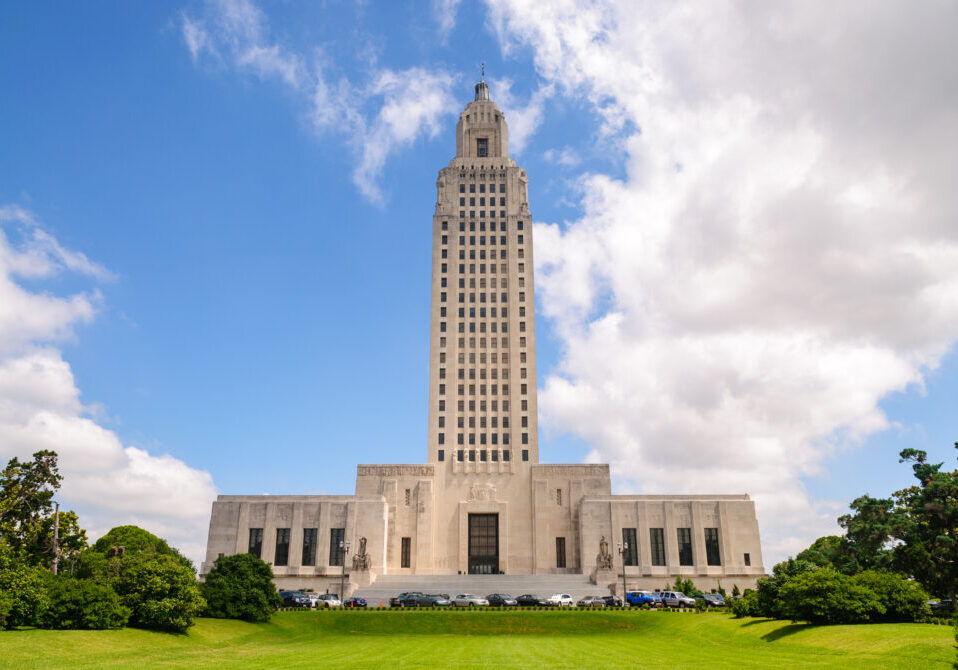Gov. Jeff Landry’s tax overhaul started moving through the House Ways and Means Committee on Thursday, as the panel advanced proposals that would sharply cut Louisiana’s personal income tax and repeal the corporate franchise tax. The more politically difficult part of the governor’s plan – around $1.4 billion in new and renewed sales taxes – are due for a committee vote early next week. Landry wants to tax everything from home repairs to diapers and streaming services to offset the cost of tax cuts that will flow largely to wealthy people and large corporations. The Times-Picayune | Baton Rouge Advocate’s Tyler Bridges reports:
On Friday, the Ways and Means Committee is expected to pass another piece of Landry’s plan. It would place a proposed amendment to the state constitution before voters statewide in March that would merge two state savings accounts, double the standard deduction for seniors, exempt the purchase of prescription drugs from local sales taxes, give teachers a $2,000 pay raise by paying off a high interest rate pension fund debt and make it harder to approve all tax breaks in the future.
The proposals to replace Louisiana’s graduated income-tax structure with a “flat” tax of 3% and completely eliminate the corporate franchise tax advanced with bipartisan support. But there was pushback from lawmakers and advocates who worry this plan will wreak havoc on state finances:
[Rep. Matthew] Willard said he fears they would raise less money than expected and leave legislators with less money to pay for schools, coastal restoration and assisting homeowners in reducing their insurance payments. Jan Moller, director of Invest in Louisiana, a Baton Rouge nonprofit, seconded Willard’s concerns that the entire package won’t collect enough money. Moller told lawmakers the Legislature cut taxes in 2008 and, beginning in 2011, spent seven years grappling with budget deficits that ended with enactment of the .45-cent sales tax in 2018 that expires July 1 next year.
Sending more minors to adult prisons
Most of the focus of the November special session is on whether lawmakers will advance Gov. Jeff Landry’s rushed effort to overhaul the state’s tax structure and constitution. But the governor’s call to convene the Legislature also included items related to “crimes that are subject to special juvenile procedures.” The Louisiana Illuminator’s Julie O’Donoghue explains how lawmakers are trying to make it easier to send children to adult prisons:
In Louisiana, 15- and 16-year-olds, and in more limited circumstances 14-year-olds, can already face adult prison sentences, though only for limited crimes. These include murder, attempted murder, manslaughter, rape, armed robbery, kidnapping, aggravated battery, a second or subsequent burglary of an inhabited dwelling and a second or subsequent violation of some drug crimes.The constitutional amendment, proposed by Sen. Heather Cloud, R-Turkey Creek, would strike that specific list from a juvenile justice provision in the constitution. Instead, she wants to insert language allowing a minor to be charged like an adult for “any crime” as long as lawmakers pass new laws to do so.
Billions of coastal restoration dollars in jeopardy
Delays in the construction of a massive coastal restoration project in Louisiana are jeopardizing billions of dollars in federal funding. The Mid-Barataria Sediment Diversion project, which is hailed as a key part to Louisiana’s effort to save its coast, has been stalled because of pending lawsuits by local leaders and fishermen. Floodlight’s Terry L. Jones reports on what’s at stake:
In a letter to Glenn Ledet, executive director of Louisiana’s coastal agency, the federal trustee body has demanded that the state provide a “clear statement” indicating CPRA “remains committed” to carrying out the diversion project or face having to pay back the $2.26 billion trustees awarded for the project. Local scientists and environmental advocates have urged state leaders to remain focused on seeing the project come to fruition if they want to save the coastline.
What Trump means for Inflation Reduction Act
Many climate-change experts and advocates are concerned about what a second Donald Trump presidency will mean for efforts to reduce planet-warming fossil fuels. Much of this anxiety centers on the fate of the 2022 Inflation Reduction Act, the nation’s largest investment in climate change and renewable energy policies. But as the Associated Press’ Jennifer McDermott and Matthew Daly explain, a complete repeal of the landmark law seems unlikely:
If Trump does target the climate law, there are provisions that are likely safe. One is a credit for companies in advanced manufacturing, because it is perceived as “America first and pro-U.S. business,” said David Shepheard, partner and energy expert at the global consultant Baringa. Incentives for electric vehicles are likely most at risk, he added. In a call Wednesday morning, Scott Segal, head of a communications group at the law firm Bracewell LLP, which represents the energy industry, said the climate law is not likely to be repealed. Dan Jasper, a senior policy advisor at Project Drawdown, said repealing parts of the climate law could backfire because most of the investments and jobs are in Republican congressional districts.
Number of the Day
$1.5 million – Amount of money that Louisiana’s Student Tuition Assistance and Revenue Trust Program, or the START Saving Program, accidentally withdrew from participating families’ accounts earlier this month. (Source: Louisiana Illuminator)
